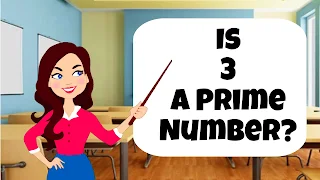Is 3 a prime number? Prime numbers are natural numbers greater than 1 that have exactly two distinct positive divisors. The answer is clear: "3 is a prime number." In fact, it's the second prime number and the smallest odd prime. Let's examine why this is the case.
- Is 3 a prime number? - Yes
- Is 3 a composite number? - No
- Is 3 a perfect square? - No
- Prime Factors of 3 - 3
- Factors of 3 - 1, 3
Is 3 a Prime or Composite Number?
Is 3 a Prime Number?
Yes, 3 is definitely a prime number. It satisfies all the requirements for primality:
- It is a natural number greater than 1
- It has exactly two distinct positive divisors (1 and 3)
- It cannot be expressed as a product of two smaller natural numbers
Why is 3 a Prime Number?
3 holds several special positions in mathematics:
- It's the second prime number (after 2)
- It's the smallest odd prime number
- It's the first Mersenne prime (2²-1 = 3)
- It's the first Fermat prime (2^(2^0)+1 = 3)
Is 3 a Composite Number?
No, 3 is not a composite number. Composite numbers have more than two distinct positive divisors. Since 3 has exactly two divisors, it cannot be composite.
Problem Statements:
| Property | Answer |
|---|---|
| Is 3 a Prime Number? | Yes |
| Is 3 a Composite Number? | No |
| Is 3 a Perfect Square? | No |
| Is 3 an Even Number? | No |
| Multiples of 3 | 3, 6, 9, 12, 15, 18, 21, 24, 27, 30,... |
| Square Root of 3 | ≈1.73205 |
| Square of 3 | 9 |
| Is 3 a Perfect Cube? | No |
| Cube Root of 3 | ≈1.44225 |
| Is 3 an Odd Number? | Yes |
Fun Facts:
- 3 is the only number that is the sum of all the previous positive integers (1+2=3)
- It's the number of spatial dimensions we experience in the physical world
- 3 is considered a "lucky prime" and a "lucky number" in number theory
- All integers not divisible by 3 have squares that are either 1 more or 1 less than a multiple of 3
- 3 is the first prime that forms a twin prime pair (with 5)
- In many cultures, 3 represents completeness (beginning-middle-end, past-present-future)
